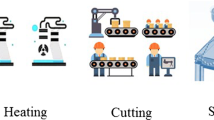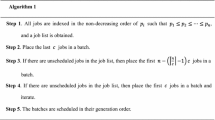Abstract
This paper investigates a single machine serial-batching scheduling problem considering release times, setup time, and group scheduling, with the combined effects of deterioration and truncated job-dependent learning. The objective of the studied problem is to minimize the makespan. Firstly, we analyze the special case where all groups have the same arrival time, and propose the optimal structural properties on jobs sequencing, jobs batching, batches sequencing, and groups sequencing. Next, the corresponding batching rule and algorithm are developed. Based on these properties and the scheduling algorithm, we develop a hybrid VNS–ASHLO algorithm incorporating variable neighborhood search (VNS) and adaptive simplified human learning optimization (ASHLO) algorithms to solve the general case of the studied problem. Computational experiments on randomly generated instances are conducted to compare the proposed VNS–ASHLO with the algorithms of VNS, ASHLO, Simulated Annealing (SA), and Particle Swarm Optimization (PSO). The results based on instances of different scales show the effectiveness and efficiency of the proposed algorithm.


Similar content being viewed by others
References
Wang, J.B., Jiang, Y., Wang, G.: Single-machine scheduling with past-sequence-dependent setup times and effects of deterioration and learning. Int. J. Adv. Manuf. Technol. 41(11–12), 1221–1226 (2009)
Wang, J.B., Gao, W.J., Wang, L.Y., Wang, D.: Single machine group scheduling with general linear deterioration to minimize the makespan. Int. J. Adv. Manuf. Technol. 43, 146–150 (2009)
Cheng, T.C.E., Lee, W.-C., Wu, C.-C.: Scheduling problems with deteriorating jobs and learning effects including proportional setup times. Comput. Ind. Eng. 58(2), 326–331 (2010)
Kuo, W.-H.: Single-machine group scheduling with time-dependent learning effect and position-based setup time learning effect. Ann. Oper. Res. 196, 349–359 (2012)
Wang, J.B., Huang, X., Wu, Y.B., Ji, P.: Group scheduling with independent setup times, ready times, and deteriorating job processing times. Int. J. Adv. Manuf. Technol. 60, 643–649 (2012)
Yang, S.-J.: Unrelated parallel-machine scheduling with deterioration effects and deteriorating multi-maintenance activities for minimizing the total completion time. Appl. Math. Model. 37, 2995–3005 (2013)
Yang, S.-W., Wan, L., Yin, N.: Research on single machine SLK/DIF due window assignment problem with learning effect and deteriorating jobs. Appl. Math. Model. 39, 4593–4598 (2015)
Wu, C.-C., Wu, W.-H., Hsu, P.-H., Lai, K.: A two-machine flowshop scheduling problem with a truncated sum of processing-times-based learning function. Appl. Math. Model. 36, 5001–5014 (2012)
He, H., Liu, M., Wang, J.B.: Resource constrained scheduling with general truncated job-dependent learning effect. J. Comb. Optim. (2015). doi:10.1007/s10878-015-9984-5
Wu, Y.-B., Wang, J.-J.: Single-machine scheduling with truncated sum-of-processing-times-based learning effect including proportional delivery times. Neural. Comput. Appl. 27, 937–943 (2016)
Niu, Y.-P., Wang, J., Yin, N.: Scheduling problems with effects of deterioration and truncated job-dependent learning. J. Appl. Math. Comput. 47, 315–325 (2015)
Wang, J.B., Wang, X.-Y., Sun, L.-H., Sun, L.-Y.: Scheduling jobs with truncated exponential learning functions. Optim. Lett. 7, 1857–1873 (2013)
Wu, C.-C., Yin, Y., Cheng, S.-R.: Single-machine and two-machine flowshop scheduling problems with truncated position-based learning functions. J. Oper. Res. Soc. 64, 147–156 (2013)
Pei, J., Liu, X., Pardalos, P.M., Migdalas, A., Yang, S.: Serial-batching scheduling with time-dependent setup time and effects of deterioration and learning on a single-machine. J. Glob. Optim. 67(1), 251–262 (2017)
Pei, J., Pardalos, P.M., Liu, X., Fan, W., Yang, S.: Serial batching scheduling of deteriorating jobs in a two-stage supply chain to minimize the makespan. Eur. J. Oper. Res. 244(1), 13–25 (2015)
Pei, J., Liu, X., Pardalos, P.M., Fan, W., Yang, S.: Scheduling deteriorating jobs on a single serial-batching machine with multiple job types and sequence-dependent setup times. Ann. Oper. Res. 249, 175–195 (2017)
Pei, J., Liu, X., Pardalos, P.M., Li, K., Fan, W., Migdalas, A.: Single-machine serial-batching scheduling with a machine availability constraint, position-dependent processing time, and time-dependent set-up time. Optim. Lett. (2016). doi:10.1007/s11590-016-1074-9
Xuan, H., Tang, L.X.: Scheduling a hybrid flowshop with batch production at the last stage. Comput. Oper. Res. 34(9), 2718–2733 (2007)
Graham, R.L., Lawler, E.L., Lenstra, J.K., Rinnooy Kan, A.H.G.: Optimization and approximation indeterministic sequencing and scheduling: a survey. Ann. Discret. Math. 5, 287–326 (1979)
Hansen, P., Mladenović, N.: Variable neighborhood search. Comput. Oper. Res. 24(11), 1097–1100 (1997)
Hansen, P., Mladenović, N., Pérez, J.A.M.: Variable neighbourhood search: methods and applications. 4OR 175(4), 367–407 (2008)
Wang, L., Ni, H., Yang, R., Pardalos, P.M., Du, X., Fei, M.: An adaptive simplified human learning optimization algorithm. Inf. Sci. 320, 126–139 (2015)
Xia, H., Li, X., Gao, L.: A hybrid genetic algorithm with variable neighborhood search for dynamic integrated process planning and scheduling. Comput. Ind. Eng. 102, 99–112 (2016)
Borges, P., Eid, T., Bergseng, E.: Applying simulated annealing using different methods for the neighborhood search in forest planning problems. Eur. J. Oper. Res. 233(3), 700–710 (2014)
Liang, X., Li, W., Zhang, Y., Zhou, M.: An adaptive particle swarm optimization method based on clustering. Soft Comput. 19(2), 431–448 (2015)
Acknowledgements
This work is supported by the National Natural Science Foundation of China (Nos. 71501058, 71601065, 71231004, 71690235, 71690230, 71671055), and Innovative Research Groups of the National Natural Science Foundation of China (71521001), the Humanities and Social Sciences Foundation of the Chinese Ministry of Education (No. 15YJC630097), and Anhui Province Natural Science Foundation (No. 1608085QG167). Panos M. Pardalos is partially supported by the project of “Distinguished International Professor by the Chinese Ministry of Education” (MS2014HFGY026).
Author information
Authors and Affiliations
Corresponding authors
Rights and permissions
About this article
Cite this article
Fan, W., Pei, J., Liu, X. et al. Serial-batching group scheduling with release times and the combined effects of deterioration and truncated job-dependent learning. J Glob Optim 71, 147–163 (2018). https://doi.org/10.1007/s10898-017-0536-7
Received:
Accepted:
Published:
Issue Date:
DOI: https://doi.org/10.1007/s10898-017-0536-7




